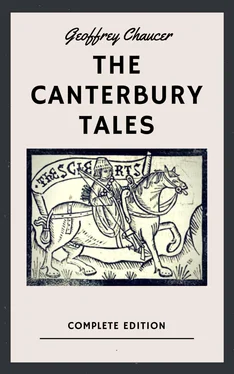What maketh this but Jupiter the king?
The which is prince, and cause of alle thing,
Converting all unto his proper will,
From which it is derived, sooth to tell
And hereagainst no creature alive,
Of no degree, availeth for to strive.
Then is it wisdom, as it thinketh me,
To make a virtue of necessity,
And take it well, that we may not eschew*, *escape
And namely what to us all is due.
And whoso grudgeth* ought, he doth folly, *murmurs at
And rebel is to him that all may gie*. *direct, guide
And certainly a man hath most honour
To dien in his excellence and flower,
When he is sicker* of his goode name. *certain
Then hath he done his friend, nor him*, no shame *himself
And gladder ought his friend be of his death,
When with honour is yielded up his breath,
Than when his name *appalled is for age*; *decayed by old age*
For all forgotten is his vassalage*. *valour, service
Then is it best, as for a worthy fame,
To dien when a man is best of name.
The contrary of all this is wilfulness.
Why grudge we, why have we heaviness,
That good Arcite, of chivalry the flower,
Departed is, with duty and honour,
Out of this foule prison of this life?
Why grudge here his cousin and his wife
Of his welfare, that loved him so well?
Can he them thank? nay, God wot, neverdeal*, — *not a jot
That both his soul and eke themselves offend*, *hurt
And yet they may their lustes* not amend**. *desires **control
What may I conclude of this longe serie*, *string of remarks
But after sorrow I rede* us to be merry, *counsel
And thanke Jupiter for all his grace?
And ere that we departe from this place,
I rede that we make of sorrows two
One perfect joye lasting evermo':
And look now where most sorrow is herein,
There will I first amenden and begin.
"Sister," quoth he, "this is my full assent,
With all th' advice here of my parlement,
That gentle Palamon, your owen knight,
That serveth you with will, and heart, and might,
And ever hath, since first time ye him knew,
That ye shall of your grace upon him rue*, *take pity
And take him for your husband and your lord:
Lend me your hand, for this is our accord.
*Let see* now of your womanly pity. *make display*
He is a kinge's brother's son, pardie*. *by God
And though he were a poore bachelere,
Since he hath served you so many a year,
And had for you so great adversity,
It muste be considered, *'lieveth me*. *believe me*
For gentle mercy *oweth to passen right*." *ought to be rightly
Then said he thus to Palamon the knight; directed*
"I trow there needeth little sermoning
To make you assente to this thing.
Come near, and take your lady by the hand."
Betwixte them was made anon the band,
That hight matrimony or marriage,
By all the counsel of the baronage.
And thus with alle bliss and melody
Hath Palamon y-wedded Emily.
And God, that all this wide world hath wrought,
Send him his love, that hath it dearly bought.
For now is Palamon in all his weal,
Living in bliss, in riches, and in heal*. *health
And Emily him loves so tenderly,
And he her serveth all so gentilly,
That never was there worde them between
Of jealousy, nor of none other teen*. *cause of anger
Thus endeth Palamon and Emily
And God save all this faire company.
Notes to The Knight's Tale.
1. For the plan and principal incidents of the "Knight's Tale," Chaucer was indebted to Boccaccio, who had himself borrowed from some prior poet, chronicler, or romancer. Boccaccio speaks of the story as "very ancient;" and, though that may not be proof of its antiquity, it certainly shows that he took it from an earlier writer. The "Tale" is more or less a paraphrase of Boccaccio's "Theseida;" but in some points the copy has a distinct dramatic superiority over the original. The "Theseida" contained ten thousand lines; Chaucer has condensed it into less than one-fourth of the number. The "Knight's Tale" is supposed to have been at first composed as a separate work; it is undetermined whether Chaucer took it direct from the Italian of Boccaccio, or from a French translation.
2. Highte: was called; from the Anglo-Saxon "hatan", to bid or call; German, "Heissen", "heisst".
3. Feminie: The "Royaume des Femmes" — kingdom of the Amazons. Gower, in the "Confessio Amantis," styles Penthesilea the "Queen of Feminie."
4. Wonnen: Won, conquered; German "gewonnen."
5. Ear: To plough; Latin, "arare." "I have abundant matter for discourse." The first, and half of the second, of Boccaccio's twelve books are disposed of in the few lines foregoing.
6. Waimenting: bewailing; German, "wehklagen"
7. Starf: died; German, "sterben," "starb".
8. The Minotaur: The monster, half-man and half-bull, which yearly devoured a tribute of fourteen Athenian youths and maidens, until it was slain by Theseus.
9. Pillers: pillagers, strippers; French, "pilleurs."
10. The donjon was originally the central tower or "keep" of feudal castles; it was employed to detain prisoners of importance. Hence the modern meaning of the word dungeon.
11. Saturn, in the old astrology, was a most unpropitious star to be born under.
12. To die in the pain was a proverbial expression in the French, used as an alternative to enforce a resolution or a promise. Edward III., according to Froissart, declared that he would either succeed in the war against France or die in the pain — "Ou il mourroit en la peine." It was the fashion in those times to swear oaths of friendship and brotherhood; and hence, though the fashion has long died out, we still speak of "sworn friends."
13. The saying of the old scholar Boethius, in his treatise "De Consolatione Philosophiae", which Chaucer translated, and from which he has freely borrowed in his poetry. The words are "Quis legem det amantibus? Major lex amor est sibi." ("Who can give law to lovers? Love is a law unto himself, and greater")
14. "Perithous" and "Theseus" must, for the metre, be pronounced as words of four and three syllables respectively — the vowels at the end not being diphthongated, but enunciated separately, as if the words were printed Pe-ri-tho-us, The-se-us. The same rule applies in such words as "creature" and "conscience," which are trisyllables.
15. Stound: moment, short space of time; from Anglo-Saxon, "stund;" akin to which is German, "Stunde," an hour.
16. Meinie: servants, or menials, &c., dwelling together in a house; from an Anglo-Saxon word meaning a crowd. Compare German, "Menge," multitude.
17. The pure fetters: the very fetters. The Greeks used "katharos", the Romans "purus," in the same sense.
18. In the medieval courts of Love, to which allusion is probably made forty lines before, in the word "parlement," or "parliament," questions like that here proposed were seriously discussed.
19. Gear: behaviour, fashion, dress; but, by another reading, the word is "gyre," and means fit, trance — from the Latin, "gyro," I turn round.
20. Before his head in his cell fantastic: in front of his head in his cell of fantasy. "The division of the brain into cells, according to the different sensitive faculties," says Mr Wright, "is very ancient, and is found depicted in mediaeval manuscripts." In a manuscript in the Harleian Library, it is stated, "Certum est in prora cerebri esse fantasiam, in medio rationem discretionis, in puppi memoriam" (it is certain that in the front of the brain is imagination, in the middle reason, in the back memory) — a classification not materially differing from that of modern phrenologists.
21. Dan: Lord; Latin, "Dominus;" Spanish, "Don."
Читать дальше












